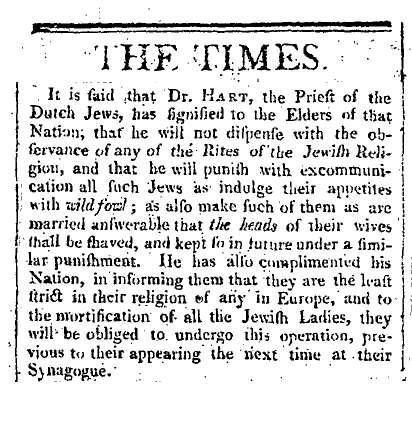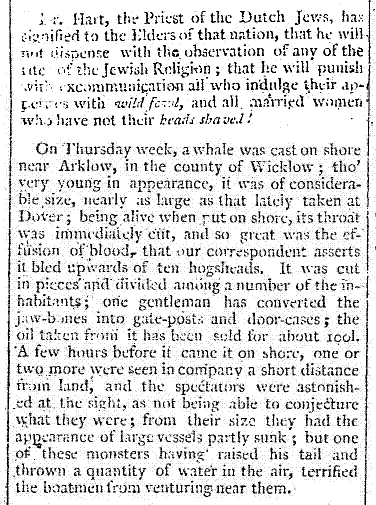In addition, I noted my provisional theory that the origin of the custom may have come about due to a hygienic issue in a time when the Plica Polonica was common, easy means of regular bathing and grooming less so, and covering the head at all times could not have been easy on the hair.
You may think it over and reject it or not. In any event, as far as I know the only Jewish women who maintain the custom of shaving their heads today are descendants of Hungarian-Romanian and Ukrainian-Polish Chassidim. However, it appears from the following source that at one time Yekke, German Ashkenazic, women did so as well.
Below are three sources from 1802 describing the same event. I include all three since two present it with a slightly different nuance and the third is simply the most readable - a clear reprint from the Times of London 10.28.1802. Also, the third one has an extra entry about whales, so that's cool.



As you can see, the "Dr. Hart, the Priest of the Dutch Jews" tried to enforce two religious norms under threat of excommunication. The first is to stop the eating of "wild fowl" and the second is that they are to make sure that their wives shave their head. Not only that, the women are barred from the synagogue until they comply.
"Dr. Hart" is of course Solomon Hirschel, the newly installed av beis din of London. The "Dutch Jews" are the Ashkenazim - in many 18th century English sources Germans are called "Dutch" which is an Anglicized rendering of Deutsch. Hence, the American Amish are also known to this day as the Pennsylvania Dutch, despite their German, not Hollandish, origin.
The Times blurb further editorializes that when he chastised his community for being "the least strict" in all of Europe, he was "complimenting" them. Traditional Jews would not have seen it or taken it as a compliment, but for Christians it was another matter.
As I wrote in another post, eventually R. Solomon would gain a reputation as being more tolerant of wrong-doing. Here we see that he came into office with a bang. I doubt he was trying to enforce head-shaving for long.
His father Rabbi Hirschel Lewin was av beis din of London for a few years in the 1750s and 60s. He was known then as Hart Lyon (hence his son being called "Dr. Hart" in 1802, whereas later it was always Hirschel, after his father's Yiddish name). If the London Jewish community was the "least strict" in Europe in 1802, it wasn't any stricter 40 years earlier. When Rabbi Hart Lyon tendered his resignation, he was asked by synagogue elders why he wanted to leave. He is alleged to have replied "Because that is the first she'eila (religious question) I have ever been asked here."
Getting back to the head-shaving, one wonders two things. First, did Rabbi Solomon Hirschel really mention head-shaving? It's hard to believe that he could have been so deluded as to think that this would fly in his new community. It seems to me that it's possible that he was talking about hair-covering in general, and the gentile press didn't realize that not all European Jewish women who covered their head shaved their hair underneath. So perhaps his chastisement about head/ hair-covering was garbled or misinterpreted. On the other hand, maybe he really was that myopic.
We can learn something about the religious strictness of London Jewry a full generation earlier in the complaints of Rabbi Solomon's father.
"Day by day we can see with our own eyes the decay of our people. We sin and act against the law of God ; all our endeavors are to associate with the Gentiles and to be like them. That is the chief source of all our failings. See, the women wear wigs (פאה נכרית) and the young ones go even further and wear décolleté dresses open two spans low in front and back (יוצאים ערומים מלפניהם ומלאחריהם טפחיים). Their whole aim is not to appear like daughters of Israel." (From a manuscript sermon translated by Charles Duschinsky.)Note that he is critical of wearing a wig. In the 18th century this was not the hallmark of a pious Orthodox woman. Think Marie Antoinette, not Bnei Brak.
Please note also that this is not the sum and substance of Hart Lyon's critiques of the religious backsliding of his community, only what's relevant for this post. This isn't an instance of a rabbi singling out women for not being modest. It's part of a full panoply of criticisms of the religious behaviors he found lacking. Great were his intentions, I am sure, but it seems that it never occurred to him to try anything other than to chastise. It didn't work and he left after 7 years, with his son assuming his office four decades later. Little must have changed.





"First, did Rabbi Solomon Hirschel really mention head-shaving? It's hard to believe that he could have been so deluded as to think that this would fly in his new community. It seems to me that it's possible that he was talking about hair-covering altogether."
ReplyDeleteSomething's not computing about that last sentence, grammar-wise. Perhaps you forgot the word "not"?
--Phil
No, I just wrote it in a lousy way. I meant to say that he was talking about hair covering per se, rather than shaving. It may be that gentiles were under the impression that Jewish women shaved their head, whether all of them did or didn't, just as today some might think so. Thus even if he was only speaking of covering the hair/ head, they interpreted it as an edict about shaving.
ReplyDeleteOn the other hand, famously the Chasam Sofer wrote that the custom should be maintained, and although he lived in Pressburg he was a German Ashkenazi all the way, and perceived himself as such until the day he died. So it's somewhat hard to see him defending a totally foreign custom as being so important. It's entirely possible that in the Frankfurt AM of his birth this is what the pious women did, and the pious Rabbi Solomon Hirschel - who was almost exactly the same age as the Chasam Sofer, and also grew up in Germany - meant exactly the same thing, that they should shave their head. As I pointed out, this was somewhat unrealistic given that 45 years earlier the young Jewish girls of London were already wearing fashionably low cut dresses.
Rav Hirsch wrote (in Horeb, I believe): "To hide one's own hair under an ornamental covering made from someone else's or even from one's own after being cut is a very old custom which is not forbidden."
ReplyDeleteB"H
ReplyDeleteI have heard two additional sources for this custom:
1. A humrah (stringency) for tevilah (immersing in a miqweh), so that twisted hairs will not constitute a disqualified tevilah. I know men who go up onto Har HaBayith, thus requiring kosher tevilah beforehand, keep their beards relatively short for the same reason.
2. Cutting the hair of the kallah before marriage to make her unattractive to goyim participating in pograms (ysh"w).
For the record, in my opinion the suggestion that it arose out of a mikva chumra is unlikely because there isn't even a hint of it until the perpetuation of this custom itself is defended.
ReplyDeleteAs for the other one, that it could have been meant to make Jewish women unattractive targets for rape, I think it's also unconvincing. Firstly, it totally ignores the pathology of rapists, and the fact that women actually don't become repulsive when they are shaved. Secondly, no one has actually produced any evidence of nobles in Europe having their way with Jewish women, neither in Jewish sources nor non-Jewish ones. There are of course instances of rape, seduction and consensual affairs, but it's hard to see how shaving would have applied or why it would have entirely escaped the record in halachic literature until it was being defended as something to keep doing. This is why I think it's most likely something that began as a private hygienic matter. This would account for its absence in rabbinic literature. They also don't talk about, you know, how women keep themselves smelling good, unless it is relevant to a halachic query. When I learned of the prevalence of hair disease in Poland to the extent that they named it after the place, and I thought about various things members of my own family have said about what hair covering did to their hair, it occurred to me that removing it altogether might have just seemed like a good idea. In a way, this actually dovetails with the mikva theory. Can a woman afflicted with "plina polonica" be tovel? Seems like the epitome of a chatzitza.
I find Rafael's suggestion that it may have arisen - or at least been perpetuated - out of a desire to compel proper head covering interesting, although in truth, do women have to cover their hair or head? It seems like it's true that if they are shaved they will cover their head, but it also seems like that's missing the forest for the trees.
S., you and your readers may be interested to know that this post is featured as one of "Today's Picks" for 1/19/11 on www.jewishideasdaily.com. Cool. I have just discovered that website; don't know if it has picked up any of your pieces before, but you're obviously on their radar.
ReplyDeleteDan, thanks. They have. If you click the name Fred MacDowell used on the story you'll see a number of times that they've linked to my posts. It's a good site, and I'm not just saying that because they drive up my hits when they do link to me (although I like that of course).
ReplyDelete